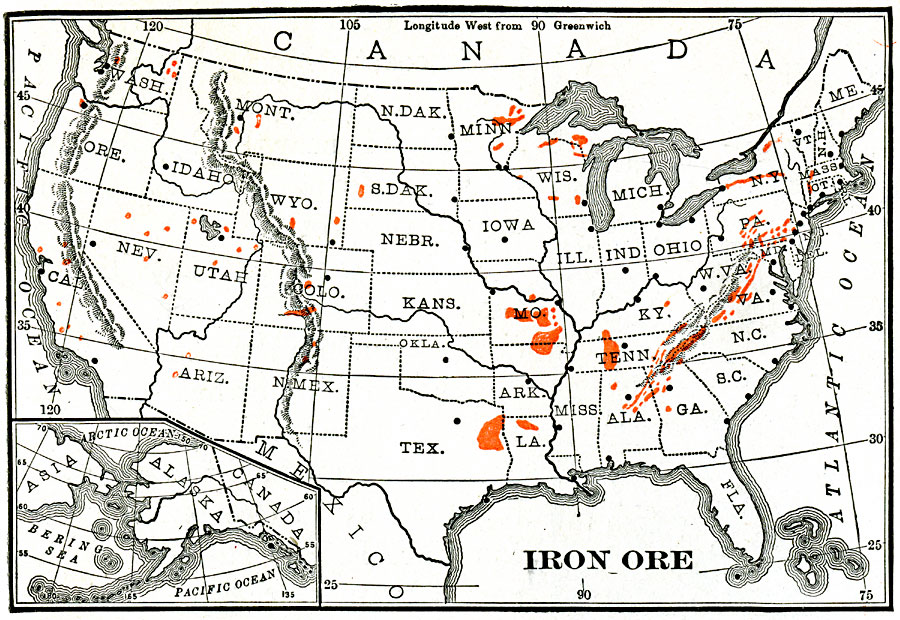Elheru Aran wrote:Simon_Jester wrote:The European colonists never seemed to have too much difficulty with local production of things like iron tools once they got established and had enough surplus resources to build self-sustaining communities. And there were plenty of iron and coal mines in the Americas once industrial technology spread. I wouldn't think this will be a problem.
It was my understanding that apart from small scale near-surface mining operations, the large majority of *refined* iron in the US was imported until after the Revolutionary War? Things like axes, hoes, woodworking tools, and so forth. It wasn't until after the Revolution that the American colonies had to jump into refining their own iron on an industrial scale (conveniently close to the beginnings of the Industrial Revolution itself). Of course, it's right around that time that everyday tools and products started transitioning from being largely wood, ceramic, tin/copper/pewter etc. to iron and steel... I can't say I've ever studied that side of the equation in much depth, but I have done some research on historical woodworking as that's one of my hobbies and you can observe some of that there.
Well, part of it is simply comparative advantage. There's not much point in putting in the time and effort to develop a domestic iron industry when ships are routinely crossing the Atlantic
anyway and it's more cost-effective to create products you can sell to European merchants in exchange for tools. That doesn't make it impossible.
LaCroix wrote:I don't know, stopping Columbus might get you a couple of decades, maybe even centuries. After all, Columbus had been a running gag in Europe because he claimed he could reach India, which everyone (correctly) knew was impossible...
If nothing else, the rapid increase in Atlantic trading will result in ships being blown out to sea (especially on the run down 'round the Cape of Good Hope). Moreover, the beginnings of the India trade will start to drive the rapid increase in ship sizes, because while you can more or less follow the coast all the way to India, it is a
long sailing voyage and many important stretches of the route take place near hostile coastlines. By 1510 or 1520 the Portuguese will still (as historical) have more or less conquered the Indian Ocean, and the Spanish will be if anything MORE interested in trying to commission ships to see if there's a shortcut to the Indies. Or, hell, anything out there at all, because the Portuguese will have a decisive lock on all trade outside Europe otherwise.
One thing that may happen if you can get 10-20 years' delay, though, is that the generation of Spaniards who expelled the last of the Moors will start to die off. This may make some difference, because there will be a narrower window between the time at which Spain becomes a player in the New World and the time at which Spain is decisively distracted by the wars of religion and, ultimately, the Dutch revolt. If Spain does NOT succeed in securing the gold of Mexico and the silver of Peru in order to finance its war machine by 1550 or so, it may end up declining to the status of a second-rate power far faster than historically.
Of course, you will still have to worry about the French, English, Dutch, and Portuguese...
If he doesn't return, people would just nod, mutter their version of "told him so", and continue expanding their reach into Africa and towards the Middle East. Only once they have developed bigger, faster and seaworthier ships in high enough quantity that they might try again (with more provisions). I'd assume you'll get a reprieve till almost 1600, when they had doubled in size... People might think that this is sufficient to reach India, and might try again.
Again, you need large and well armed ships just for the India run. The journey is actually several times longer than a trip to the Americas, you spend considerable periods out of sight of land, as illustrated here:
https://upload.wikimedia.org/wikipedia/ ... _India.gif
These were the routes followed by actual Portuguese convoys trading in the Indies.
Moreover, the natives at all points along the way were at least in the Iron Age, and in East Africa and India proper they had some degree of sailing tradition and at least rudimentary knowledge of gunpowder weapons. This was not the 'easy way out' compared to the Americas, although sending one ship to India was certainly more lucrative than sending the same ship to the Americas.
There's a reason that some of the biggest, best armed, and fastest sailing freighters of the 1700s were "Indiamen." And even in the early 1500s, the Portuguese had large, capable ships during this period- carracks- that were smaller than the later Spanish galleons but quite large enough to sail to the New World and back. They had to, or they'd never have gotten their foot in the door in the India trade.
Even if not - if you get vaccines, and get muskets/smoothbore cannons and Age of sail era ships in circulation, (which should be easily possible if you have 200 years run up time and the box) you, you should be able to repel any attempt of conquest, indefinitely, even if the whole armada came your way.
Yes, but that's a separate issue. I was specifically addressing the point that trying to wipe out Columbus' expedition is probably counterproductive.
Borgholio wrote:Hm. Interesting question. The box can produce tools. Can it produce a plow-horse? One of the limiting factors on native American civilizations was the lack of animal draft power...
The box is big enough for a decent-sized draft horse I think, but I don't know if that would technically be considered a tool.

You COULD produce yokes that could be fitted to North American bison though. They're pretty strong.
It's an important question, because probably the single most important 'tool' the natives lacked in the pre-Columbian era was draft animals. Also note that domesticating a wild animal that, in real life, no one has domesticated is going to be hard; 200 years may well not be enough.
Yeah the Meso-American cultures are batshit crazy when compared to their Northern cousins. I would want to give help to the North American tribes first...as they were far less violent. They could then "persuade" the other cultures in the south to come around peacefully.
It's a pity we don't know more about the Mound Builder civilization...
If not, then while Europe ravaged the Aztec and the Inca, North America would remain safe.
This is rather repugnant, since a majority of all the human costs of the death and conquest of the New world happened in what is now Latin America- not because the Spanish were uniquely evil, but simply because they went after the most populated part of the real estate.
Since the box can produce educational material, it might be worth a shot to produce histories of the future so the Meso-Americans would be more willing to put aside the savagery and cooperate to fend off the Europeans.
"Savagery" as you put it was not the issue. The Mesoamerican cultures were quite organized and advanced, not a bunch of hate-maddened ogres. Insofar as they had issues cooperating... well, they did, but so did, say, the Greek city-states.
I certainly wouldn't want to give them gunpowder technology until they get rid of the human sacrifice stuff though.
I find it amusing to wonder whether YOU would be in favor of human sacrifices if YOU thought it necessary to keep the sun rising in the morning...


